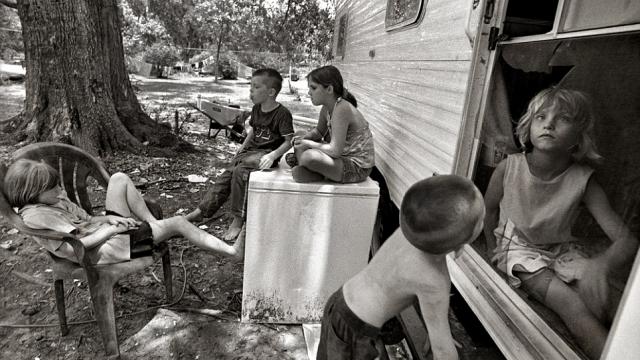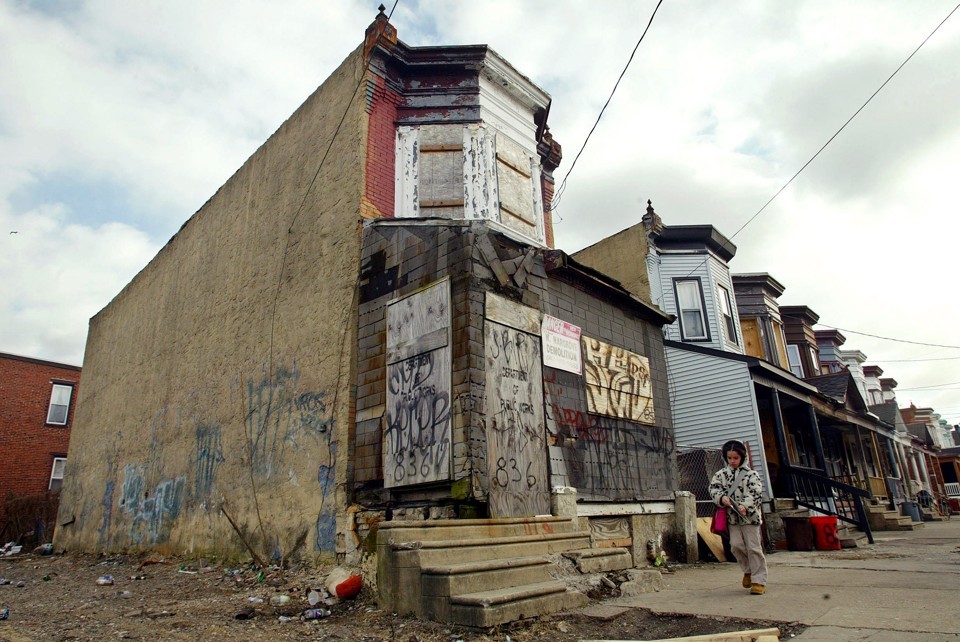
This is the first in a two-part series.
“Written laws are like spiders’ webs,” Scythian philosopher Anacharsis told Athenian lawmaker Solon 2,500 years ago, “and will like them only entangle and hold the poor and weak, while the rich and powerful will easily break through them.” For at least as long as we’ve had laws in hierarchical societies, their modes of enforcement have been mostly classist.
So naturally, the United States of America, the most economically unequal developed nation in the world, is a representative example of a legal system that directs wealth upward and the heavy hand of the law downward. Our nation’s judges, lawyers, cops, and bureaucrats are trained to look at civic life as we look at market transactions: the people are rational consumers, and our legal choices will adhere to incentives and disincentives. That’s okay, the narrative continues, because having a lot of money is normatively desirable, and having no money is a sign of moral failure.
Of course, we are not characters in a free market economics textbook, rationality is a complicated thing, and unlike the hypothetical men trucking and bartering under the guidance of the Invisible Hand, we exist in material contexts over which we don’t always have full agency. The wealthy live longer than the poor, have far better quality of life indicators, experience less domestic violence, better mental health, better education, and better relationships, all because they don’t have to constantly struggle, compromise, and risk their health to make ends meet. And not only is it expensive to be poor, it also often puts you on the wrong side of the law whether you intend to be there or not.
While moderate and liberal legal thinkers have sometimes argued for compassion for the poor, and strong social movements have sometimes forced the resolution of material injustices, a bias against the poor is hardwired into the adversarial, pay-for-services legal system itself, and classism manifests itself in countless individual laws and legal practices.
How many is “countless?” Recently, I surveyed a wide array of my friends—lawyers, farmers, schoolteachers, artists, and blue collar workers—asking them to name laws or legal practices that disproportionately hurt poor people (which many of us are or have been). I received hundreds of responses, and consolidated them into a long, but non-exhaustive, list of 34 ways America’s legal system is really ugly for poor people. Items 1-17 are below:
1. Parking and traffic tickets
In a theme we’ll see throughout this list, hefty parking and traffic violation fines are already unmanageable for poor people before they escalate—but once they escalate, they’re completely unmanageable and will hurt your credit score, cost you your driver’s license, and can sometimes land you in jail.
2. Bail
There’s a growing consensus that bail makes no moral or policy sense: there are better ways for the state to ensure defendants show up for their trials, and the bail system is inevitably classist, given that a wealthy person’s assets (and connections to wealthy friends and family) allows them to walk away before trial for almost all felony crimes. Defendants lacking in such wealth must rely on exploitive bail bonders who deplete the funds those defendants need for legal defense.
3. Court assessment, automation, and compensation fees
In the journey from arrest to conviction to sentencing, defendants will pay countless unexpected fees, from a few dollars to hundreds of dollars: filing fees, jury request fees, bond-filing charges, lab fees if the crime lab is involved in the trial, fees to pay for your own jail booking, assessment and pre-sentencing report fees, and even fees to ask for a waiver of fees.
4. Tolls on roads
They’re an example of the “death by a thousand cuts” that poor people experience every day: expenses that don’t make your heart jump if you know you have a lot of money in the bank, but are demoralizing micro-horrors if you think you might be right on the bubble.
5. Food and sales taxes
Any tax on the purchase and consumption of material goods is a regressive tax.
6. Trespassing and vagrancy laws in communities without common land
Space does not permit a full exposition of these dignity-stripping municipal codes. Punishing the homeless, whose situations are caused or exacerbated by our economic system, is Hunger Games-level dystopia.
7. Forced waivers and arbitration in contract law
Contract jurisprudence assumes parties enter into agreements on basically level playing fields. In fact, the party with material power often gets to set the terms, such as insisting that the weaker party never be able to sue and instead enter imbalanced arbitration processes, or that the more powerful party is indemnified from the harms that may result from their failure or malfeasance.
8. Inability to afford counsel in civil cases
The Constitution guarantees you the right to an attorney if you're a defendant in a criminal felony case, but in civil cases, you have no such right. That's alarming because civil cases include domestic violence injunction hearings, where I've seen victims forced to represent themselves against abusers who could afford a lawyer. I've seen judges look those victims straight in the eye and say, “you should have had a lawyer with you.” Funding for our nation’s heroic legal aid programs is never enough; legal aid attorneys estimate they serve only a tiny percentage of those needing legal help.
9. Laws limiting reproductive health care access
Because health care in America is a commodity rather than a right, and because anti-abortion crusaders have done an end run around Supreme Court decisions guaranteeing a woman’s right to choose (by making it extremely hard to operate reproductive health clinics in many states), poor women simply don’t have the options wealthy women have, whether they want to terminate a pregnancy or preserve one, or just want healthy reproductive care.
10. Charging money for juvenile detention
Writing for Colorlines, Julianne Hing reports that parents in California are charged $25 for every day their kids are locked up in juvenile detention, and they pay large investigation and assessment fees on top of that. Although there are provisions to waive some of the fees, these involve more hearings and families who make marginally higher than poverty wages are not likely to have their fees waived. Meanwhile, a kid whose family can afford an attorney may not have to sit in detention--or go through the system--at all.
11. Taxes on feminine hygiene products
Although many medical necessities are exempt from sales tax, feminine hygiene products like tampons and sanitary napkins traditionally are not. Although 12 U.S. states have sales tax exemptions for feminine hygiene products, 38 states do not. This means women are paying lifetime taxes of over $3000 per person, tens of millions of dollars per year per state.
12. Jail or drivers’ license suspensions for failure to pay child support
According to the National Conference of State Legislatures, all 50 states have provisions for suspending or revoking drivers' licenses for failure to pay child support; of course, driving without a valid license is illegal in all 50 states, and all 50 states also have laws providing for jail time for nonpayment of support. While no one would question the parents’ responsibility to support their children, you can’t work while you’re in jail, and you often can’t get to work without driving. Meanwhile, wealthy noncustodial parents simply never have to experience this added punishment--unless, for some reason, they want to.
13. Tying privacy protections to property interests
The real reason most drug busts occur in the neighborhoods of poor people (particularly poor people of color) is that it's simply easier to bust drug users or dealers there. Meanwhile, bourgeois stoners can get loaded in their McMansions behind several sets of closed doors with virtually zero risk of ever getting nabbed. Similarly, the less money you have for housing, the harder it is to stay safe from crime, abuse, or harassment. And once you lose your housing, you lose any veneer of privacy whatsoever.
14. Eminent domain
In 2005, the United States Supreme Court, in Kelo v. City of New London, held that the government may take private property with "just compensation" in order to revitalize economically depressed areas. That basically means the government can take your house or business from you, pay a minimal price that you don't get to negotiate, and then procede to let businesses and developers gentrify the area, leaving low-income residents with no real options for living where they had lived or working where they had worked.
15. Jaywalking enforcement
City cops are cracking down on street-crossings in areas where low-income people are likely to cross streets, such as near light-rail stations. This includes ticketing people for over $200 just for crossing in the final seconds of the flashing “Walk” signs. Poor people forced to route through urban chaos are the victims here.
16. Immigration law
The entire immigration system is classist, from privileging wealthy entrants into America to a cavalcade of processing fees. According to the American Immigration Council, naturalization applications are now over $600, employment authorization applications (ironically) are over $400, and a certificate of citizenship application is now a whopping $1770. A few fee waivers are available, but recent increases far outstrip available waivers, in part because Congress is refusing to increase funding for various immigration-related agencies.
17. How judges talk to poor people in court
Not all judges are cruel. But the cruel ones are usually classist. I’ve heard the same judges talk very differently to people in similar legal entanglements, undoubtedly based on perceptions of those people’s wealth and social status.
Stay tuned for the second part of this article, covering items 18-34, which runs next week.
Matt Stannard is Policy Director at Commonomics USA.
3 WAYS TO SHOW YOUR SUPPORT
- Log in to post comments












